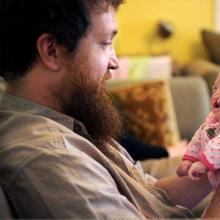illness
One of my days last week started with my usual wake-up routine — sitting in a chair, sipping my first cup of coffee, checking up on Facebook posts — when one of them made me smile.
A long-time friend in Cleveland has endured 250 days of chemotherapy and radiation. He’d just received the results of his latest scan: No trace of cancer anywhere. Yes! Chuck noted that “the collateral damage has been great” from all the chemicals and radiation. He now stumbles around and has trouble typing, both temporary conditions. But he’s cancer-free.
Stumbling, yet still standing.
I log onto Facebook every day. It tells me that it’s OK to talk about a bad date, to engage in family arguments for all to see, or even to display how envied one believes him/herself to be via self-portraits from a bathroom mirror.
Let’s be honest. Social media has caused an eruption of platforms in which people across the globe feel comfortable laying it all out there. There is a certain acceptance of divulging personal information that my parents’ generation wouldn’t dare ever bring up in a private forum, much less a public one. This phenomenon raises the question: If it’s OK to talk about almost anything these days, why are important topics still being held captive in the land of anonymity?
Abortion. Incest. Rape. Bankruptcy. Depression. Mental illness.
And then there’s suicide.
So why write about it now? Because I fell into the trap of ignoring an important topic simply because it had never hit close to home. And then came the phone call.
Today, three years to the day after my daughter Katherine’s (“Katie’s”) death (May 9, 2010), we inter her cremains. “IT’S RAINING, IT’S POURING” was written the day we learned that Katie’s incurable Leiomyosarcoma had taken a turn for the worse. In memory of Katherine (“Katie”) Elizabeth Slaikeu Nolan.
Gordon C. Stewart Feb. 11, 2009
It’s raining, it’s pouring
The old man is snoring
He went to bed and he bumped his head
And couldn’t get up in the morning
It’s a day like that. I bumped my head on the illness of a 33 year-old loved one. It’s raining sadness. I’m having trouble getting out of bed in the morning.
Terminal illness has a way of doing that unless you believe in miracles of divine intervention or you have extraordinary powers of denial.
I spent an entire day a couple of months ago in an outpatient clinic (I'm fine; thanks for asking). I met a lot of nurses, and every one of them was excellent.
When Velda came to take away the remains of my lunch, I offered her my untouched can of ginger ale.
"I don't drink soft drinks," she replied. Since I rarely do either, we started chatting.
Velda grew up in Tanzania, moved to Belgium, spent several years in London, and finally came to the United States. She returns to Tanzania regularly, and she is not happy with what she sees.
"I grew up eating lots of vegetables," she told me. "We might have had ice cream once every three years. But now people are eating American-style junk food. They don't know it's not good for them."
No one wants to talk about death at the dinner table, at a soccer game, or at a party, says Lizzy Miles, a social worker in Columbus, Ohio.
But sometimes people need to talk about the “taboo” topic and when that happens, they might not be able to find someone who will listen, she says.
“Whenever people hear I’m a hospice worker, they talk to me about death. It doesn’t matter if I’m on an airplane, gambling in Las Vegas, or in a grocery store line,” she said. “I really see firsthand the need to let people talk. It’s my gift to others.”
Her gift sparked the birth of “death cafes” in the U.S., a trend that started in England and is about to take off across America, she said.
So you’ve heard the flu shot is somewhat ineffective this year, and, though you have a normal immune system, you don't want to take the Eucharist from a common chalice.
Part of me kind of wants to slap you.
Obviously, that's not what Jesus would do. We know what Jesus did — he offered you his lifeblood, saying "This is my blood of the covenant, which is poured out for many." Ever after, Christians have taken wine and bread, a sacrament which binds us together in communion with other Christ-followers around the globe and through two millennia.
For the last few months, because my cancer treatment had decimated my immune system, I haven't been able to drink from the common chalice (or to eat most raw food, go to the movies, or get on the bus without a face mask). I really miss it. So I want to share two key insights I’ve had about the common Eucharistic cup.
NASHVILLE, Tenn. -- Eric and Ruth Brown believe nothing about daughter Pearl Joy's life is a mistake.
They say God gave Pearl her bright red hair and wide blue eyes, as well as the genetic disorder that created a cleft in her upper lip and caused her brain's development to stall in the first weeks in the womb.
"Things didn't go wrong," Eric Brown said. "God has designed Pearl the way he wanted, for his glory and our good."
That belief has sustained the Browns during the past six months, ever since a routine ultrasound revealed that the couple's third child has alobar holoprosencephaly, a rare genetic condition that's almost always fatal. A specialist told the Browns she would probably die in the womb and advised them to end the pregnancy early.
It's one thing to talk about God's will when life is good. It's another when a doctor is saying your baby won't live.
The Browns were forced to consider religious, medical and ethical issues most parents never will. And nobody could make their decision for them.
The Browns never considered abortion. They believe that Pearl is "fearfully and wonderfully made," as Psalm 139 puts it, and God alone should decide when she lives and when she dies.
Seeing Pearl's beating heart on the ultrasound also persuaded them to continue the pregnancy, even if the odds were stacked against her.
"If there is a chance, you say yes to that chance," Eric Brown said. "The only thing I know about parenting is that you say yes."
So far, Pearl has beaten the odds.
Few babies with Pearl's disorder make it to term, and of those who do, only 3 percent survive birth, according to the Dallas-based Carter Centers for Brain Research in Holoprosencephaly and Related Malformations. Pearl has a particularly severe form of the condition, which means her brain never divided into two hemispheres.
She turned 11 weeks old Oct. 12, a milestone that the Browns celebrated by lighting 11 candles and singing "Happy Birthday."
Philip Weeks fondly remembers the days when his wife of 56 years, June, was a nurse and an artist whose paintings were compared to Rembrandt's.
Her paintings still hang in their home in Lynchburg, Va., but almost everything else has changed for the couple after she was diagnosed with possible Alzheimer's and then an abrupt form of dementia.
In one moment, the retired Charismatic Episcopal bishop said, she would lean over to kiss him. "An hour later, she looked at me and said, 'Who are you?'" he recalled.
When the person you married goes through a dramatic change, what's a spouse to do? As Valentine's Day approaches, clergy, ethicists and brain injury experts agree: There are no easy answers.
There's something special about the bookends of our lifetimes. I became a first-time father seven months ago and a hospice chaplain just one month past. Growing up and growing old, especially the first and last months of our lives, can be surprisingly similar experiences.
I fed my daughter sweet potatoes for the first time last night. Introducing her to solid foods has been a treat. While we're trying our best to teach her the sign language words for "food", "more", and " all done", Robin still finds closed-mouth grumble-whines to be the best way to let us know she thinks sweet potatoes aren't all that hot. Another subtly nuanced whine might instead wonder, "You don't happen to have any more mashed banana or applesauce around, would you?" My attempt to turn the filled spoon into an acrobatic and roaring airplane met with scant success.
Last week was a-buzz about the six-month anniversary of the Affordable Care Act. And rightfully so.
My alarm went off at 5 a.m. today. As I sat up and unzipped my sleeping bag, a gust of Oklahoma wind bitterly ushered me into a new day. Drops of rain splashed my face, extinguishing the last few embers of my sleepiness.








